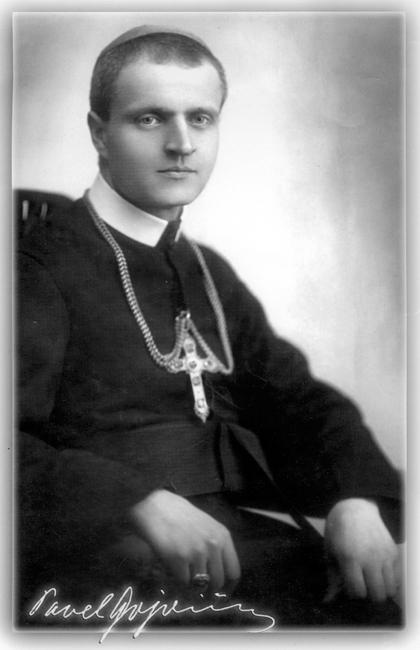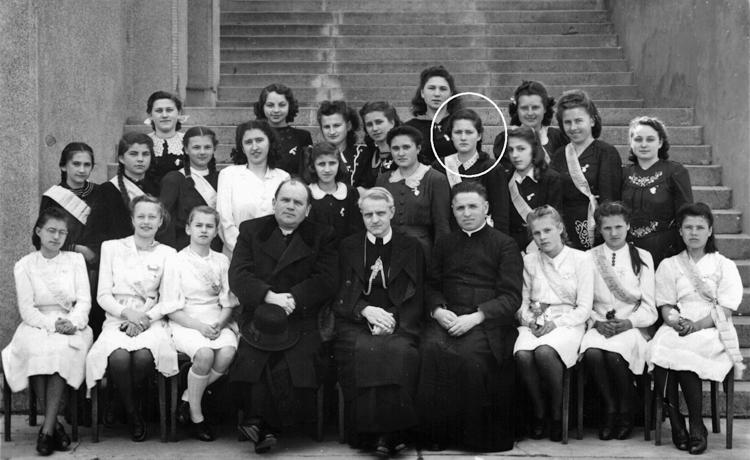Bishop Pavel Gojdic was acting as an administrator of the Greek Catholic Diocese in Presov region since 1927. There were also a few Russian Orthodox inhabitants under his jurisdiction. Believers under his administration were composed of four different nationalities: Slovak, Rusyn, Ukrainian and Hungarian. They differed also in their language. His efforts to minimize their differences and to emphasize the unifying factors of his believers were cut short by Slovak nationalism, which led to Slovak autonomy in October 1938 and later to the independent Slovak State in March 1939. This nationalist movement also influenced Slovak priests in his diocese, and Gojdic's activities were not well perceived by the fascist state.
Gojdic nevertheless spoke up openly in favor of Jews from the very beginning of their persecution in Slovakia. On January 25, 1939, two days after the establishment of a special committee by the Slovak autonomist government, charged with defining the Program for the solution of the Jewish question, the bishop wrote a special letter, addressed to all parishes in his Presov diocese. In this letter he warned about disastrous results, which might be caused by these discriminative policies. He reminded people of the basic principles of their belief – that every human being has equal rights when he faces God. He also warned of the consequences of Nazi ideology and racism.
Gojdic’ attitudes caused turmoil among Slovak priests, who mostly sympathized with the nationalist stream in the Catholic Church. In summer 1939 they wrote a memorandum expressing their dissatisfaction with Gojdic's actions. Thus, in November 1939 Gojdic resigned from his office. Six months later the Vatican reacted; the Holy See accepted his resignation from the position of apostolic administrator, but at the same time appointed him as Bishop of the Presov diocese. This appointment only increased the tension between him and the government.
This was Gojdic’s moral record at the time when Slovakia entered the period of deportations. After the Slovak parliament confirmed a special expulsion law, which stated: “It is permitted to expel Jews from Slovakia...”, Gojdic wrote a protest against the cruel deportations of Slovak Jewry, which were being carried out by the clerical Hlinka party. He also asked the Vatican to intervene and to make Tiso, the Slovak head of State and a Catholic priest, to put an end to these acts of cruelty. In addition, Gojdic stated that in case the Holy See would not be able to stop the deportations, the Vatican should at least insist on Tiso's resignation in order to keep the Catholic Church out of the criminal activities.
The protest was given to Giuseppe Burzio, the Vatican representative in Slovakia, in order to deliver it to the Holy See. This letter was published after the war in a volume of selected Vatican documents. As it is well known today, all the protests and interventions addressed to the Vatican failed to prevent the deportations of Jews from Slovakia, nor did they manage to compel Tiso to stand up for Slovak Jewry.
On October 26, 1942 the Slovak Security Services informed the 14th department of the Ministry of Interior about a high number of fictitious conversions taking place. The report pointed out several cases when only one member of a Jewish family converted to Christianity in order to defend his whole family. Out of 249 Jewish families only 533 Jews converted to Greek Catholic or Russian Orthodox faith in order to rescue another 1500 members of their families, who did not convert. Apart from that, most of those who had converted continued to actively pursue Judaism either in an open or a hidden manner. According to the Security Service report, Gojdic held a conversion ceremony in the town of Michalovce, where the bishop publicly kissed the foreheads of those Jews, who decided to convert. Many believers, members of the Catholic Church, left the church in protest of the bishop's gesture.
After the war, those who had been saved by Gojdic foresaw that he would be out of favor with the Communist regime and offered to help him immigrate to the West. However, Gojdic refused to leave his post as bishop. He was prosecuted and sentenced to many years in prison. The Jews tried to help him and testified on his behalf – a letter was addressed to the President of Czechoslovakia, Antonin Zapotocky, on May 15, 1956 – but in vain.
John Paul II beatified Bishop Gojdic on November 4, 2001, honoring his lifelong behavior, and stating that even during crucial moments of his life, he remained loyal to the principles of the Greek Catholic Church as well as the Apostolic See in Rome.
In 2007 he was recognized as Righteous Among the Nations by Yad Vashem.


